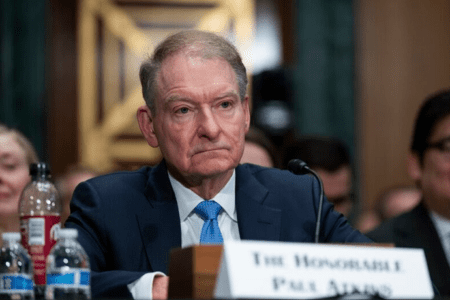The U.S. SEC’s recent decision to exclude meme coins from its purview marks a pivotal shift in crypto oversight, leaving a regulatory vacuum for these speculative assets. While the SEC steps back, the U.S. CFTC and U.S. DOJ are expected to take the lead in prosecuting fraud and market manipulation. Experts warn of increased risks for retail investors, with some likening meme coins to “casino gambling.”
SEC’s Memecoin Decision: Key Takeaways
On February 27, 2025, the U.S. SEC’s Division of Corporation Finance issued guidance clarifying that most meme coins—defined as crypto assets driven by social media trends, cultural phenomena, or humor—do not qualify as securities under federal law. This decision hinges on the Howey Test analysis:
- No common enterprise: Memecoin transactions lack pooled investments managed by promoters to generate returns.
- Profit expectations driven by speculation: Value derives from market sentiment, not managerial efforts.
- Classification as collectibles: Analogous to digital art or trading cards, meme coins are excluded from SEC registration requirements.
The guidance marks a strategic pivot from the Gensler-era “regulation by enforcement” approach, aligning with Commissioner Hester Peirce’s view that many meme coins fall outside the SEC’s jurisdiction. However, the SEC retains authority over fraudulent activities under broader anti-fraud statutes.
Regulatory Vacuum: Who Will Oversee Meme Coins?
The SEC’s withdrawal creates uncertainty over oversight. Key stakeholders likely to fill the gap include:
- Commodity Futures Trading Commission (CFTC)
- Meme coins could fall under the CFTC’s purview if classified as commodities, similar to Bitcoin and Ethereum. The CFTC has historically targeted crypto market manipulation and fraud.
- Hypothesis: CFTC may expand its crypto enforcement division to address meme coin-specific risks like wash trading and pump-and-dump schemes.
- Department of Justice (DOJ)
- The DOJ has already prosecuted meme coin fraud under existing financial statutes. Recent cases in Massachusetts targeted market manipulation via bots and fake volume inflation.
- Prediction: Expect increased DOJ-FBI collaboration to tackle insider trading and Ponzi schemes.
- Federal Trade Commission (FTC) & State Regulators
- The FTC could address deceptive marketing practices, while states like New York may enforce stricter AML/KYC rules under their BitLicenses.
- Congressional Action
- Experts like Anwar Sheluchin (McMaster University) argue that legislative clarity is critical to define jurisdictional boundaries and protect retail investors.
Fraud Prosecution and Compliance Enforcement
While the SEC steps back, enforcement will intensify across other agencies:
- DOJ’s Crypto Task Force: Focused on market manipulation, tax evasion, and fraud linked to celebrity-endorsed coins (e.g., Trump Coin’s 2024 pump-and-dump).
- CFTC Oversight: Likely to target derivatives tied to meme coins and enforce anti-manipulation rules.
- Self-Regulation & Auditors: Crypto auditors may emerge to verify tokenomics, smart contracts, and AML compliance, as seen in proposals by platforms like OneSafe.
Expert Opinions and Market Sentiment
- Hester Peirce (SEC Commissioner): “Many memecoins are not securities, but investors must still exercise extreme caution.”
- Vic Laranja (Crypto Commentator): “99% of meme coins will go to zero, driven by speculative hype cycles.”
- Anwar Sheluchin (McMaster University): “Market manipulation and short-term volatility make meme coins akin to casino gambling,”
Hypothesis: The Future of Meme Coin Regulation
- Tiered Compliance Frameworks
- Platforms listing meme coins may adopt stricter AML/KYC protocols to avoid CFTC or DOJ scrutiny.
- Example: Mandatory disclosures for celebrity-endorsed tokens to prevent insider dumping.
- State-Level Fragmentation
- States like California and Texas could impose licensing requirements, creating a patchwork of regulations.
- Congressional Intervention
- A 2025–2026 bill may classify meme coins as “digital collectibles” under CFTC oversight, with carve-outs for non-fraudulent community-driven projects.
- Global Coordination
- FATF guidance on meme coins could standardize anti-fraud measures across jurisdictions, reducing regulatory arbitrage.
Conclusion
The SEC’s decision signals a broader policy shift toward limiting its crypto oversight, placing meme coins in a regulatory gray zone. While the CFTC and DOJ are poised to address fraud, gaps in investor protection persist. Long-term stability hinges on congressional action and industry self-regulation, balancing innovation with accountability. FinTelegram will continue monitoring enforcement trends and legislative developments in this volatile segment.
Disclaimer: This report synthesizes publicly available data and expert analyses. Regulatory outcomes may vary based on evolving legal and market conditions.





